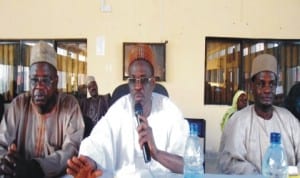Business
CBN Warns On Politicisation Of Missing $49.8bn Revenue
The Central Bank of Nigeria has warned against the politicisation of the alleged diverted revenue of $49.8bn by the Nigerian National Petroleum Corporation.
The Governor of the CBN, Mr. Lamido Sanusi, had written to President Goodluck Jonathan to complain about the failure of the NNPC to remit the said amount to the Federation Account in contravention of extant laws.
He was reported to have said the amount represented 76 per cent of the value of crude oil lifting during the period.
The complaints are contained in the letter to the President dated September 25, 2013.
However, the corporation on Tuesday refuted the claims that it diverted the said amount, adding that the allegation by the CBN governor was borne out of misunderstanding of the workings of the oil and gas industry and the modality for remitting crude oil sales revenue into the Federation Account.
But the apex bank, in a statement yesterday by the Director, Corporate Communications Department, Mr Ugochukwu Okoroafor, said while it would neither confirm or deny the origin of the letter, the capacity of the bank was strengthened or undermined by the extent to which the country was able to increase foreign exchange earnings.
In the performance of this role, the CBN stated in the statement that it was natural for the apex bank to be concerned at the low level of accretion to reserves and the Excess Crude Account in spite of the strong international oil prices.
It said, “The attention of the CBN has been drawn to an emerging public discourse around a letter purportedly written by the governor (CBN) to the President, expressing concern over non remittance of oil revenues by the NNPC. “The CBN will neither confirm nor deny the existence of such a letter and considers any discussions by it on the alleged letter to be inappropriate.”
However, the Nigerian National Petroleum Corporation (NNPC) has refuted reports.
Nigerian governors are poised to confront President Goodluck Jonathan on the alleged refusal of the Nigerian National Petroleum Corporation to remit $49.8bn to the Federation Account.
The governors based their decision on the revelation made by the Governor of the Central Bank of Nigeria, Mallam Lamido Sanusi, in a letter issued by him that the NNPC had failed to remit the money, which was said to be the proceeds from crude sales between January 2012 and July 2013.
The said amount was said to have represented 76 per cent of the value of crude oil lifting during the period, in which the NNPC was said to have remitted $15.5bn, representing a paltry 24 per cent of the total value of $65.3bn.
This was one of the decisions arrived at by the governors during their meeting in Abuja on Wednesday night.
The meeting, which was held under the aegis of the Nigeria Governors’ Forum, and was presided over by its Chairman, who is also the Governor of Rivers State, Mr. Rotimi Amaechi, ended in the early hours of yesterday.
The governors also expressed worry over the refusal of the Federal Government to call for the meeting of the National Economic Council in the last four months.
They also regretted that the council’s meeting, which ought to hold on Thursday (yesterday), was postponed indefinitely.

L-R: Director of Pension, Office of the Head of the Civil Service of the Federation, Mr Vesely Zafi, Permanent Secretary, federal Ministry of Defence, Abuja, Mr Aliyu Ismaila and Provost, Federal College of Education, Yola, Prof. Abdulmumin Sa’ad, at the interactive session with federal civil servants in Adamawa State recently
Business
Fidelity Bank To Empower Women With Sustainable Entrepreneurship Skills, HAP2.0
Business
President Tinubu Approves Extension Ban On Raw Shea Nut Export
Business
Crisis Response: EU-project Delivers New Vet. Clinic To Katsina Govt.
-
Maritime4 days ago
Nigeria To Pilot Regional Fishing Vessels Register In Gulf Of Guinea —Oyetola
-

 Sports4 days ago
Sports4 days agoGombe-Gara Rejects Chelle $130,000 monthly salary
-
Maritime4 days ago
Customs Declares War Against Narcotics Baron At Idiroko Border
-

 Sports4 days ago
Sports4 days agoTEAM RIVERS SET TO WIN 4×400 ” MORROW” …Wins Triple jump Silver
-
Maritime4 days ago
NIMASA,NAF Boost Unmanned Aerial Surveillance For Maritime Security
-

 Sports4 days ago
Sports4 days agoNPFL Drops To 91st In Global League Rankings
-

 Sports4 days ago
Sports4 days agoNIGER DELTA GAMES PANACEA TO YOUTH DEV”
-

 Sports4 days ago
Sports4 days agoNPFL Impose Fines On Kwara United Over Fans Misconduct

